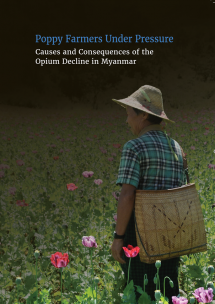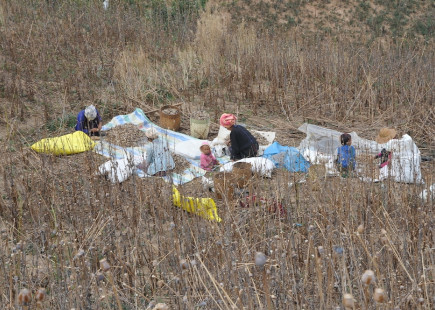Poppy Farmers Under Pressure Causes and Consequences of the Opium Decline in Myanmar
Regiones
Building on previous TNI research and publications, this report analyses the causes and consequences of the declining opium cultivation and production in Myanmar and the surrounding regions.

Descargas
-
Poppy Farmers Under Pressure: Causes and Consequences of the Opium Decline in Myanmar (PDF, 8.64 MB)Tiempo medio de lectura: 120 minutos*
-
ၸၢဝ်းသူၼ်ယႃႈလမ် ၸိူဝ်းထူပ်းဝႆ့ႁႅင်းတဵၵ်းလၢႆၸိူဝ့်ပိူင် (Shan language) (PDF, 6.15 MB)Tiempo medio de lectura: 120 minutos*
Autores

TNI.
The drugs market in Myanmar has seen some profound changes in recent decades, and is changing from being dominated by opiates to one in which amphetamine-type stimulants (ATS) are most prevalent. Poppy cultivation in Laos, Myanmar and Thailand boomed in the 1970s and 1980s, and the border regions of the three countries became known as the ‘Golden Triangle’. By the 1980s, Myanmar (then internationally known as Burma) had become the world’s largest opium-cultivating country. Since the late 1990s, however, Myanmar has seen a significant decline in opium cultivation, although it remains the largest producer in Southeast Asia. It has dropped to very low levels in Thailand, and fallen significantly in Laos. Poppy growing in Myanmar resurged after 2007, but never reached the earlier levels. There is also significant illicit poppy cultivation in India, including in areas bordering Myanmar, but there are no official figures.
At the same time, the use of ATS use in the region has grown hugely. Myanmar has become a major ATS-producing country. The most popular form is methamphetamine tablets, which are widely and cheaply available in the country. The production and use of crystal methamphetamine, commonly known as ‘ice’, has also increased, with most production destined for export to other countries in the region.
This report focuses on analysing the causes and consequences of the declining opium cultivation and production in Myanmar, with some references to Northeast India. It analyses the socio-economic conditions of poppy-growing communities as well as various policy responses and their impacts on cultivation levels and communities. The briefing also highlights the specific issues and needs of women who grow opium. It analyses the link between opium cultivation in Myanmar and the international drug market, and the rise of ATS use and production in Myanmar. Finally, the briefing makes a number of policy recommendations.
Myanmar has entered a very unstable and uncertain period. Apart from the challenges brought about by COVID-19 and the continuing armed conflict in the ethnic borderlands, the country has plunged into further violence and chaos following the Tatmadaw (national army) coup in February 2021. This report analyses some of the impacts of these developments on the opium economy and poppy-growing communities.
The briefing is based on field research conducted by TNI and several local organisations and researchers (often farmers) in major opium-cultivating areas in Myanmar during late 2020 and the first half of 2021. The research was carried out in Sadung, Tanai and Putao Townships in Kachin State, Kutkai Township in northern Shan State, Pekhon, Hsihseng, Hopong and Loilem Townships in southern Shan State, and Tachileik, Mong Ping and Mong Hsat Townships in eastern Shan State. Some research was also carried during the same period in Manipur and Arunachal Pradesh in Northeast India.
This report builds on previous TNI research and publications, in particular Withdrawal Symptoms in the Golden Triangle – A Drugs Market in Disarray (2009) and Bouncing Back – Relapse in the Golden Triangle (2014). These two regional studies analyse developments in the drugs market, policy responses and their impact on affected communities in Myanmar and other countries in the region. These reports fill an important gap as they aim to go beyond analysing only one single country or substance, and instead take a regional view, analyse different kind of drugs available in the region, and link drug use, production and trafficking issues in one study. In addition, these reports make alternative drug policy recommendations, which are based on evidence from the field, views and visions of local communities and the organisations that represent them. They are also based on human rights and a focus on achievable measures which contribute to positive outcomes in other key fields, including development, health, inclusion, gender equality and peace. TNI strongly believes that drug policies based on these key values, and which are made with participation of affected communities and relevant local organisations, will have much better outcomes for all members of society.
